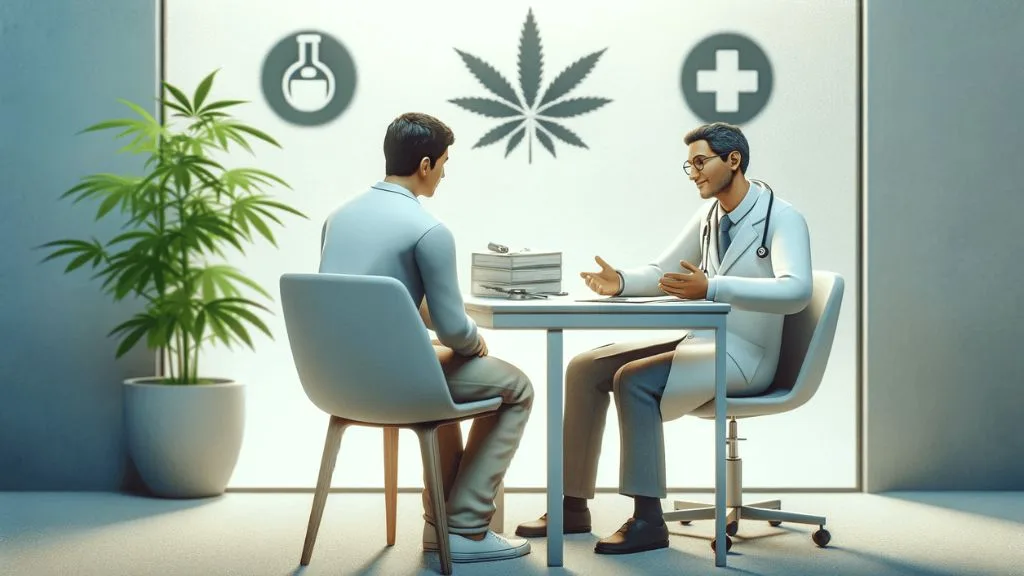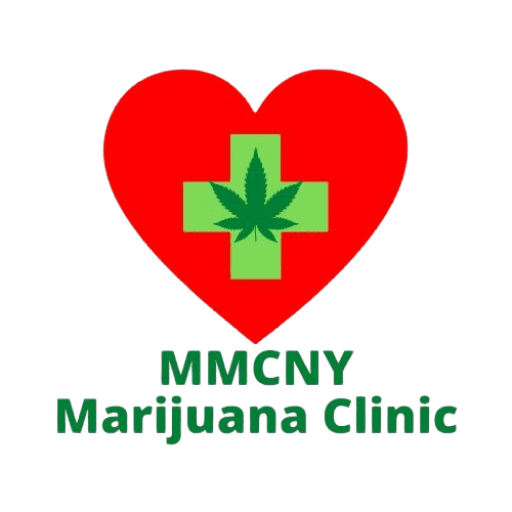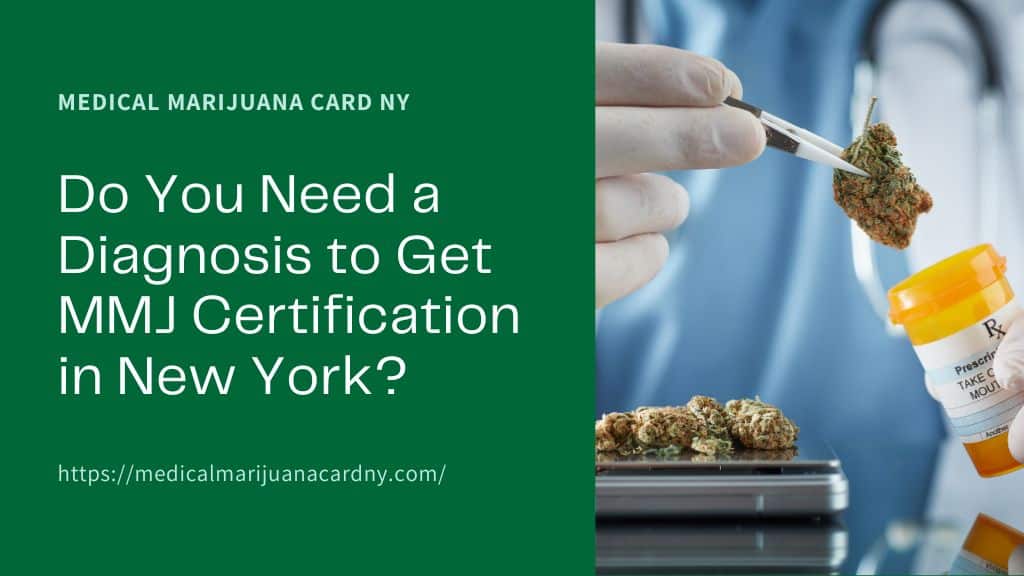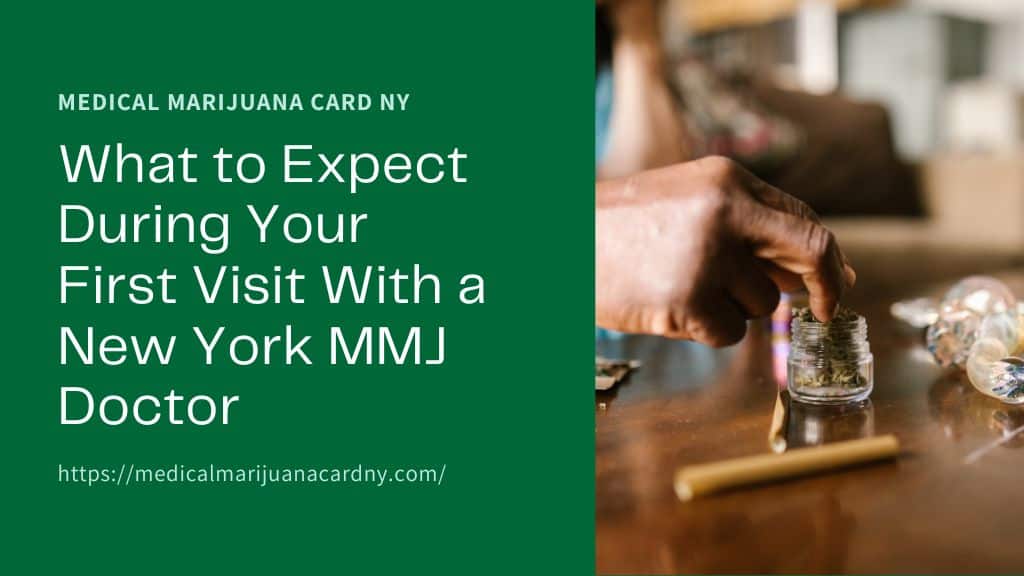Did you know that in New York, doctors play a crucial role in helping patients understand how to use medical marijuana safely and effectively? Medical marijuana doctors are not just there to give you a prescription; they’re your guides in navigating the world of medical marijuana.
These doctors explain which conditions qualify for medical marijuana and help patients figure out the best ways to use it, like how much to take and what form to use. They also teach patients about the possible side effects and how to avoid any harmful interactions with other medicines.
With over 200,000 certified patients in New York, doctors have a big job in making sure everyone knows how to use medical marijuana properly. They even help patients understand the complex laws around medical marijuana, ensuring that they stay within legal boundaries.
As more people turn to medical marijuana for treatment, the role of these doctors becomes even more important. In this blog, you’ll learn more about how these doctors educate and support patients, making medical marijuana a safer and more effective treatment option.
Read on to discover how doctors are making a difference in the lives of patients across New York.
Table of Contents
Toggle- Role of Medical Marijuana Doctors in Patient Education
- Who Can Become a Certified Medical Marijuana Doctor in New York?
- What Is the Process for a Doctor to Recommend Medical Marijuana in New York?
- How Do Medical Marijuana Doctors Assess a Patient’s Eligibility?
- What Educational Responsibilities Do Medical Marijuana Doctors Have Towards Their Patients?
- Why Is It Important for Doctors to Educate Patients About the Benefits and Risks of Medical Marijuana?
- What Information Should Doctors Provide Regarding Dosage and Administration Methods?
- How Can Doctors Help Patients Understand the Side Effects and Potential Interactions With Other Medications?
- What Role Do Doctors Play in Guiding Patients on Selecting the Right Strain and Product?
- Which Follow-Up Measures Should Doctors Take to Ensure Ongoing Patient Education and Safety?
- Navigating New York’s Medical Marijuana Laws with Doctor Guidance
- How Can Doctors Assist Patients in Navigating New York’s Medical Marijuana Laws?
- What Are the Legal Implications of Using Medical Marijuana in New York, and How Do Doctors Communicate These to Patients?
- Where Can Patients Obtain Medical Marijuana Legally in New York, and How Do Doctors Guide Them in This Process?
- The Impact of Doctor-Patient Communication on Medical Marijuana Outcomes
- Why Is Open Communication Between Doctors and Patients Crucial for Successful Medical Marijuana Treatment?
- How Can Doctors Effectively Address Patient Concerns and Misconceptions About Medical Marijuana?
- What Strategies Can Doctors Use to Ensure Patients Adhere to Their Medical Marijuana Treatment Plan?
- Continuous Education and Updates
- Advocacy and the Role of Medical Marijuana Doctors
- Who Are the Key Advocates for Medical Marijuana Rights in New York, and What Is Their Relationship with Medical Marijuana Doctors?
- How Can Doctors Advocate for Patients’ Rights to Access Medical Marijuana in New York?
- Why Is Advocacy Important for Expanding Access to Medical Marijuana in New York?
- What Can Doctors Do to Support Legislative Changes That Benefit Medical Marijuana Patients?
- Conclusion
Role of Medical Marijuana Doctors in Patient Education
Medical marijuana doctors in New York play a key role in educating patients about using cannabis for medical purposes. These doctors do more than just write prescriptions; they help patients understand how to use medical marijuana safely and effectively.
They explain which medical conditions qualify for marijuana use and guide patients on dosage, method of administration, and potential side effects. They also teach patients about the legal aspects of medical marijuana use, helping them stay compliant with state laws.
As medical marijuana becomes more common, these doctors are essential in making sure patients are well-informed and confident in their treatment choices.
Who Can Become a Certified Medical Marijuana Doctor in New York?
In New York, not just any doctor can recommend medical marijuana. To become certified, a doctor must be licensed to practice medicine in New York State and must complete a state-approved course on medical marijuana.
This training covers everything from the science behind medical marijuana to the legal requirements for prescribing it. After completing the course, the doctor must register with the New York State Department of Health to become a certified medical marijuana provider.
This MMJ certification ensures that doctors are knowledgeable and qualified to help patients use medical marijuana safely and effectively.
What Is the Process for a Doctor to Recommend Medical Marijuana in New York?
Recommending medical marijuana in New York is a structured process. First, the doctor must assess whether the patient has a condition that qualifies for medical marijuana use, such as chronic pain, cancer, or epilepsy.
Once the condition is confirmed, the doctor discusses the potential benefits and risks of medical marijuana with the patient. If both the doctor and patient agree that medical marijuana is a suitable treatment, the doctor issues a certification.
The patient then registers with the New York State Medical Marijuana Program to receive a medical marijuana card, which allows them to purchase cannabis from a licensed dispensary. This process ensures that medical marijuana is prescribed responsibly and legally.
How Do Medical Marijuana Doctors Assess a Patient’s Eligibility?
Assessing a patient’s eligibility for medical marijuana is a careful process. Doctors first review the patient’s medical history to determine if they have a qualifying condition. They also consider whether the patient has tried other treatments and whether those treatments were effective.
During the evaluation, doctors discuss the patient’s symptoms, their severity, and how they impact daily life. They may also consider the patient’s overall health and any potential risks associated with using medical marijuana. This thorough assessment ensures that medical marijuana is only recommended to patients who are likely to benefit from it.
What Educational Responsibilities Do Medical Marijuana Doctors Have Towards Their Patients?
Medical marijuana doctors have significant educational responsibilities. They must ensure that patients understand how to use medical marijuana correctly, including the proper dosage and method of administration.
Doctors also educate patients about potential side effects, such as dizziness or dry mouth, and how to manage them. Additionally, they provide information on how medical marijuana might interact with other medications the patient is taking.
Legal education is also crucial; doctors explain New York’s laws regarding medical marijuana, including where patients can legally purchase it and how much they can possess. By fulfilling these educational responsibilities, doctors help patients use medical marijuana safely and effectively, improving their overall treatment outcomes.
Why Is It Important for Doctors to Educate Patients About the Benefits and Risks of Medical Marijuana?
Doctors need to educate patients about the benefits and risks of medical marijuana because it helps patients make informed decisions about their treatment. Medical marijuana can offer relief from chronic pain, nausea, and other symptoms, but it also comes with potential risks like dependency, cognitive impairment, and interactions with other medications.
When doctors explain both the positive and negative aspects of medical marijuana, patients are better equipped to weigh the pros and cons. This education is crucial because it ensures that patients are using medical marijuana safely and responsibly, reducing the likelihood of adverse effects. Studies show that informed patients are more likely to adhere to their treatment plans and achieve better health outcomes.
What Information Should Doctors Provide Regarding Dosage and Administration Methods?
Doctors should provide clear and detailed information about how to use medical marijuana, including the correct dosage and administration methods. Since medical marijuana comes in various forms—like oils, edibles, and vaporizers—it’s important for doctors to explain the pros and cons of each method.
For instance, inhaling marijuana provides quicker relief but may be harsher on the lungs, while edibles take longer to take effect but offer more prolonged relief.
Doctors should also educate patients on how to start with a low dose and gradually increase it if necessary, to avoid potential side effects. This guidance helps patients find the most effective and safe way to use medical marijuana for their specific condition.
How Can Doctors Help Patients Understand the Side Effects and Potential Interactions With Other Medications?
Doctors play a critical role in helping patients understand the side effects of medical marijuana and how it might interact with other medications they are taking. Common side effects like dizziness, dry mouth, or fatigue might be mild for some patients but severe for others, depending on their health condition and other medications.
Doctors need to explain these possible side effects and advise patients on what to do if they experience them. Additionally, medical marijuana can interact with medications like blood thinners, antidepressants, or seizure medications, potentially leading to dangerous side effects.
Doctors should review the patient’s current medications and provide guidance on how to use medical marijuana safely without compromising the effectiveness of other treatments.
What Role Do Doctors Play in Guiding Patients on Selecting the Right Strain and Product?
Selecting the right strain and product of medical marijuana can be overwhelming for patients, which is why doctors play an essential role in this process. Different strains of marijuana have varying levels of cannabinoids like THC and CBD, which affect the body differently.
For example, some strains are better for pain relief, while others might be more effective for anxiety or sleep disorders. Doctors should assess the patient’s specific condition and symptoms to recommend the most appropriate strain and product.
They can also guide patients on choosing between different forms of medical marijuana, like oils, capsules, or topical creams, to ensure the treatment is tailored to the patient’s needs.
Which Follow-Up Measures Should Doctors Take to Ensure Ongoing Patient Education and Safety?
Follow-up care is crucial in ensuring that patients continue to use medical marijuana safely and effectively. After the initial consultation, doctors should schedule regular follow-up appointments to monitor the patient’s progress and address any concerns.
During these visits, doctors can reassess the patient’s dosage, evaluate the effectiveness of the treatment, and adjust the treatment plan if necessary. They should also encourage patients to report any new side effects or issues they encounter.
Continuous education is important, as doctors can provide updated information on medical marijuana, such as new research findings or changes in state regulations. This ongoing support helps patients stay informed and safe throughout their treatment.
Navigating New York’s Medical Marijuana Laws with Doctor Guidance
Understanding and following New York’s medical marijuana laws can be challenging for patients, but doctors play a crucial role in guiding them through the process. These laws are in place to ensure that medical marijuana is used safely and legally. By providing clear and accurate information, doctors help patients navigate these regulations with confidence.
How Can Doctors Assist Patients in Navigating New York’s Medical Marijuana Laws?
Doctors in New York are key in helping patients understand and comply with the state’s medical marijuana laws. First, they assess whether a patient qualifies for medical marijuana based on specific medical conditions recognized by the state, such as chronic pain, epilepsy, or multiple sclerosis.
Once a patient is deemed eligible, the doctor provides a certification that the patient can use to apply for a medical marijuana card. This card is essential for legally purchasing medical marijuana in New York. Throughout this process, doctors ensure that patients are fully aware of their legal responsibilities, such as not sharing their marijuana with others and following dosage recommendations.
What Are the Legal Implications of Using Medical Marijuana in New York, and How Do Doctors Communicate These to Patients?
Using medical marijuana in New York comes with several legal responsibilities that patients must follow. Doctors are responsible for educating patients about these legal implications to avoid any unintentional violations. For instance, patients must understand that they are only allowed to use medical marijuana for the condition specified by their doctor, and they must not exceed the prescribed dosage.
Additionally, patients are not permitted to drive while under the influence of marijuana, as it can impair their ability to operate a vehicle safely. Doctors communicate these legal guidelines clearly during consultations, ensuring that patients understand the rules and the potential consequences of breaking them. This education helps patients stay compliant with the law while benefiting from their treatment.
Where Can Patients Obtain Medical Marijuana Legally in New York, and How Do Doctors Guide Them in This Process?
In New York, patients can legally obtain medical marijuana from state-licensed dispensaries, but navigating this process can be confusing without proper guidance. After receiving a medical marijuana card, patients are allowed to purchase their medication from these dispensaries, which are regulated to ensure product safety and quality.
Doctors guide patients in choosing the right dispensary by providing information on reputable locations and advising them on what to look for in terms of product types and strains. Some dispensaries may specialize in different forms of marijuana, such as oils, tinctures, or vaporizers, and doctors help patients select the best option based on their medical needs. By providing this guidance, doctors ensure that patients obtain their medical marijuana legally and safely.
This structured approach by doctors helps patients feel more confident and secure in their use of medical marijuana, ensuring that they benefit from their treatment while staying within the legal boundaries set by the state of New York.
The Impact of Doctor-Patient Communication on Medical Marijuana Outcomes
Effective communication between doctors and patients is essential for successful medical marijuana treatment. When doctors and patients openly discuss treatment options, potential risks, and expectations, it leads to better health outcomes and ensures that the patient feels supported throughout the process.
Why Is Open Communication Between Doctors and Patients Crucial for Successful Medical Marijuana Treatment?
Open communication is vital in medical marijuana treatment because it builds trust and ensures that patients fully understand their treatment plan. When doctors take the time to explain the benefits and risks of medical marijuana, patients are more likely to follow their guidance. This communication also helps patients feel comfortable asking questions, which can prevent misunderstandings or misuse of medical marijuana.
According to research, patients who have strong communication with their healthcare providers are more likely to adhere to treatment plans and report better overall satisfaction with their care. This is especially important with medical marijuana, where correct usage is crucial for safety and effectiveness.
How Can Doctors Effectively Address Patient Concerns and Misconceptions About Medical Marijuana?
Doctors can effectively address patient concerns and misconceptions by providing clear, evidence-based information during consultations.
For example, some patients may worry about the stigma associated with using marijuana or fear potential side effects. Doctors should reassure patients by explaining the differences between medical and recreational marijuana, emphasizing that medical marijuana is used under controlled conditions for therapeutic purposes.
Additionally, doctors can dispel myths by presenting factual information from reputable sources, helping patients feel more confident in their treatment. By actively listening to patients and addressing their concerns, doctors can create a more positive and supportive treatment experience.
What Strategies Can Doctors Use to Ensure Patients Adhere to Their Medical Marijuana Treatment Plan?
To ensure that patients adhere to their medical marijuana treatment plan, doctors can employ several strategies. First, they should provide clear instructions on how to use the medication, including the correct dosage and method of administration.
This reduces the risk of patients using too much or too little, which can affect the treatment’s effectiveness. Doctors can also schedule regular follow-up appointments to monitor progress and make any necessary adjustments to the treatment plan.
Additionally, doctors should encourage patients to keep a journal of their symptoms and experiences, which can help track the treatment’s impact and identify any issues early on. By maintaining ongoing communication and support, doctors can help patients stay committed to their treatment plan.
Continuous Education and Updates
Medical marijuana is a rapidly evolving field, so it’s important for doctors to stay informed about the latest research and developments. Continuous education ensures that doctors can provide the best possible care to their patients.
How Do Medical Marijuana Doctors Stay Updated on the Latest Research and Developments in the Field?
Medical marijuana doctors stay updated on the latest research and developments by participating in continuing medical education (CME) programs, attending conferences, and reading medical journals. CME programs offer courses specifically focused on medical marijuana, covering topics like new treatment protocols, emerging research, and changes in state regulations.
Attending conferences allows doctors to network with other professionals in the field and learn about the latest advancements directly from experts. Reading peer-reviewed journals also keeps doctors informed about the most recent studies and clinical trials, helping them apply the latest knowledge to their practice.
What Resources Can Doctors Recommend to Patients for Further Education on Medical Marijuana?
Doctors can recommend several reliable resources to help patients learn more about medical marijuana. Websites like the Mayo Clinic and the National Institute on Drug Abuse (NIDA) provide comprehensive information on the medical use of marijuana, including its benefits, risks, and the science behind it.
Additionally, doctors can direct patients to support groups or forums where they can connect with others who are using medical marijuana for similar conditions. These resources offer patients a chance to share experiences and gain insights from peers.
By guiding patients to trustworthy sources, doctors ensure that they receive accurate and up-to-date information that can enhance their understanding and management of their treatment.
Advocacy and the Role of Medical Marijuana Doctors
Advocacy plays a crucial role in shaping the medical marijuana landscape in New York, and doctors are at the forefront of this movement. By supporting patients’ rights and pushing for legislative changes, medical marijuana doctors can help ensure that their patients have access to the care they need.
Who Are the Key Advocates for Medical Marijuana Rights in New York, and What Is Their Relationship with Medical Marijuana Doctors?
Key advocates for medical marijuana rights in New York include organizations like the Drug Policy Alliance (DPA), the Marijuana Policy Project (MPP), and various patient advocacy groups. These organizations work to change laws, reduce stigma, and increase access to medical marijuana for those in need.
Medical marijuana doctors often collaborate with these advocates to promote the safe and effective use of cannabis in medical treatments. Doctors provide valuable insights based on their clinical experience, helping advocates shape policies that reflect the realities of patient care. This partnership between doctors and advocates is essential for advancing the medical marijuana movement in New York.
How Can Doctors Advocate for Patients’ Rights to Access Medical Marijuana in New York?
Doctors can advocate for their patients’ rights to access medical marijuana in several ways. First, they can educate lawmakers and the public about the medical benefits of marijuana, using evidence-based research to dispel myths and misconceptions.
Doctors can also testify at legislative hearings, sharing their firsthand experiences with medical marijuana and how it has positively impacted their patients. By writing articles, participating in public forums, and engaging with the media, doctors can raise awareness about the need for broader access to medical marijuana.
Additionally, they can support their patients in navigating the legal system, helping them understand their rights and advocating for fair treatment under the law.
Why Is Advocacy Important for Expanding Access to Medical Marijuana in New York?
Advocacy is essential for expanding access to medical marijuana in New York because it helps bring about necessary changes in laws and regulations. Without strong advocacy, many patients might not be able to access the treatments they need due to restrictive laws or lack of awareness among healthcare providers.
Advocates work to ensure that medical marijuana is recognized as a legitimate treatment option for a variety of conditions, not just the most severe cases. This broader recognition can lead to more inclusive laws, making medical marijuana accessible to a larger number of patients.
Advocacy also helps reduce the stigma associated with medical marijuana, encouraging more doctors to become certified and more patients to seek treatment.
What Can Doctors Do to Support Legislative Changes That Benefit Medical Marijuana Patients?
Doctors can support legislative changes that benefit medical marijuana patients by actively participating in the policy-making process. This can include working with advocacy groups to draft legislation, meeting with legislators to discuss the needs of their patients, and providing expert testimony at hearings.
Doctors can also join professional organizations that support medical marijuana, such as the American Medical Association (AMA) or the New York State Medical Society, to amplify their voice in the policy debate.
Additionally, doctors can encourage their patients to share their experiences with lawmakers, helping to personalize the issue and demonstrate the real-world impact of medical marijuana on people’s lives. By taking these actions, doctors can help create a more supportive legal environment for medical marijuana patients in New York.
Conclusion
Medical marijuana doctors in New York play a vital role in educating patients, advocating for their rights, and guiding them through the complex landscape of medical marijuana use. From helping patients understand the benefits and risks of cannabis to navigating the state’s legal requirements, these doctors ensure that patients can access and use medical marijuana safely and effectively.
Their involvement in advocacy also helps to expand access to this important treatment option, ensuring that more patients can benefit from its therapeutic effects. As the medical marijuana field continues to evolve, the role of these doctors will remain crucial in supporting patient education and advancing public health in New York.
Resources
https://cannabis.ny.gov/practitioners
https://cannabis.ny.gov/marihuana-regulation-and-taxation-act-mrta
https://cannabis.ny.gov/cannabis-law-overview
https://www.health.ny.gov/regulations/medical_marijuana_practitioner_list/
https://en.wikipedia.org/wiki/Cannabis_in_New_York
https://cannabis.ny.gov/dispensing-facilities





